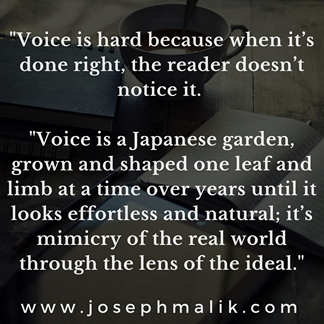Malik
 Auror
Auror
To true. I feel sometimes like I have a terrible education in voice, because it's almost non-existent in most of the books I read. I sometimes think it's actually me and I just have a terrible time recognizing and understanding what voice even is, but then there's the rare author that does feel different, even if I can't quite pinpoint why.
Done well, voice is invisible, which makes it one of the hardest things to learn and pretty much the last thing that any author masters. The best way to grok voice is to read voraciously, hundreds if not thousands of books over years and years, while looking for it. It helps if you have a formal education in writing; it's not remotely necessary, but it will speed things up a little.



 Sage
Sage Dreamer
Dreamer Myth Weaver
Myth Weaver